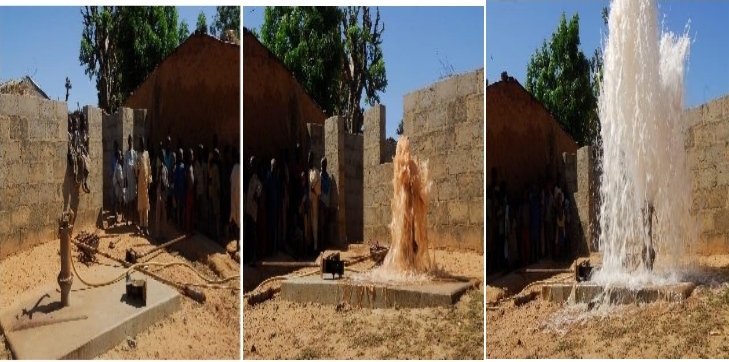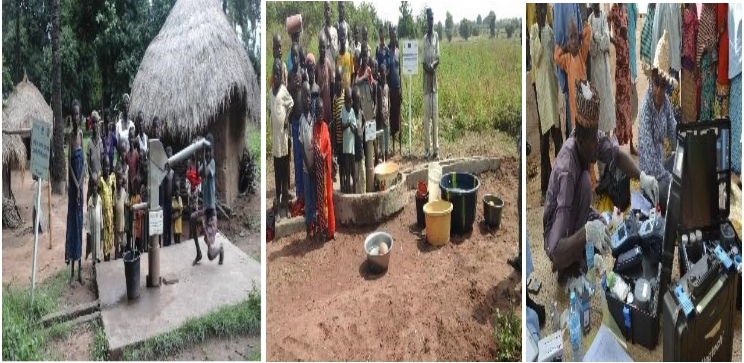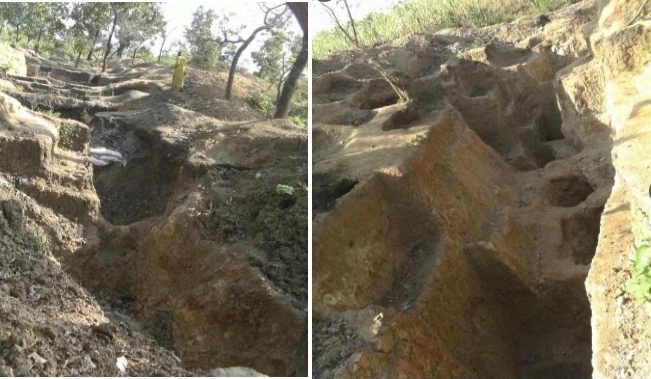Nigeria Memoirs – 3 : Glitter in water
By Col Akhil Gupta
The glitter of Gold does cause a rush. A first time visit to Dubai gold souks makes you catch your breath. All of us have grown watching the wild west – lawless, violent, gun slinger movies with fortune seekers discovering and prospecting gold sites. None can forget Gregory Peck in ‘Mackenna’s Gold’. In California goldfields, it is said that 80,000 “forty-niners” – the fortune seekers of 1849, had assembled and this grew to 250,000 in just a few years. It is estimated that here, around 2 billion $ worth Gold was extracted in a decade. Usually, the panning of the surface soil yields fine grains like gold dust, but there had been occasions when big nuggets have also been discovered. The gigantic Holtermann Nugget and the Welcome Stranger weighing an unbelievable 70 Kg+ were found in Australia.
My work in Nigeria used to take me across the length and breadth of the country for operational audit of water resources, primary health care centres and eye hospitals. In one of my operational audits exclusively dedicated to water resources extended over a period of 18 working days. Herein, I had travelled to 380 locations, a total distance of 6355 Km by road with more than 2/3rd of the distance on rural tracks. To put in perspective, the overall distance exceeded far more than a return journey between Chennai and Srinagar J&K.
A non-functional hand pump being re-activated

When I was inspecting one of the water resource locations in Gurera LGA (administrative unit similar to our district), I observed a very large quantity of sediments in water drawn from a Hand Pump making it undrinkable unless further filtration was done. On filtering, which unusually took a long time, the water was found to have a typically light muddy look with a sparkle. The instant field water bacteriological check revealed that the water was fit for drinking as per WHO standards and the chemical test performed also did not give us any reason to doubt the presence of harmful elements like arsenic or lead that could cause health problems. Surprisingly, the villagers appeared satisfied and did not seem perturbed by this sparkling phenomenon.

Though the water was not unfit based on bacteriological and chemical considerations, yet the water source being too muddy, needing a very long time for filtration was a serious issue. In absence of a permanent filtration facility, it did not meet the criteria of a functional drinking water source for the community. It had to be closed down. And, in lieu another water source in a nearby area was agreed to be developed for the community. The village elders were quite pleased with the news of opening of another water source but were extremely agitated to close the existing source, whose material and parts would be removed for utilization in the renovation of the new one. Since the water source parts were ours / Govt, there was no merit in their request. Soon it was time to close for the day and I checked into the comfort of a hotel in the nearby town.
The rule of law does not run well enough in rural areas of Nigeria. This is more prominent in certain states including the area under reference. However, our organization, has had no reason to fear since we had been sincerely working for the good of the people for a very long time with no ulterior motives. We were usually provided advance warning of any likely violence and provided protection and escorts by local community whenever required. Early next morning, I had visitors who were certainly from the wrong side of the law. I was concerned but not necessarily unduly perturbed. They wanted status quo on the water source and were even willing to forgo the newly planned one. This meant very little sense. On further inquiry, they confided that I would become an accomplice if the truth was told. I agreed only on the condition that they share with me all details and if good of the community was in question, I was willing to look the other way.
It was then that they told me about the illegal gold mining in the area. This water source spot was now considered sacred and had been given a cult status since it was here that the presence of gold was first identified. The water here was not used for drinking. The belief existed that as long as water continues to flow however much muddy but with a sparkle, they would remain beneficiaries of gold. The women had identified the presence of gold through this water source and had brought it to the attention of the men folk. The men got the filtered water tested for gold specifically and then having realized the potential of the area and had hit the gold jack pot few months later. Upon digging randomly around the water hand pump, initially they had been disappointed till they struck a gold vein in the nearby hill side and had started carrying out prospecting in the area. They were easily able to access small quantities of gold available near the surface. It did not require too deep digging. I expressed a desire to see the gold mining first hand. I was asked to leave my vehicle and my staff and go along with them and promise complete confidentiality from the Govt authorities. Though, I suspect the some of the Govt authorities would have definitely been hand in glove with them.
On reaching the site, I discovered a well-run small-scale industry in action. Armed security was spread in multiple tiers and the gold diggers were cutting through thin veins of gold running up and down in an irregular fashion deep into pits. It was an uncontrolled free for all digging in all directions everywhere. The gold was not in the form of dust and grains but was embedded along lines like branches of a tree spread across the womb of mother earth. They had purifying acids readily available for cleaning, alongside fire for melting and forming small bits into bigger chunks. These nuggets were then weighed on fine scales and packed into poly packs with specific details. Quick transportation outside the state to maintain secrecy was all part of a planned operation. No commercial activity of the gold was carried out within the state to maintain a high level of secrecy.

My request to photograph the activity was politely but firmly declined along with warning to keep the entire information confidential. With difficulty, I was allowed to photograph the discarded area. Usually, such mine areas run out of the gold deposits soon, and the massive ones in a decade or so. Here, the gold bonanza lasted only a couple of years and is currently given up as exhausted, thereby, giving me an opportunity to share all the details with a free conscience.




